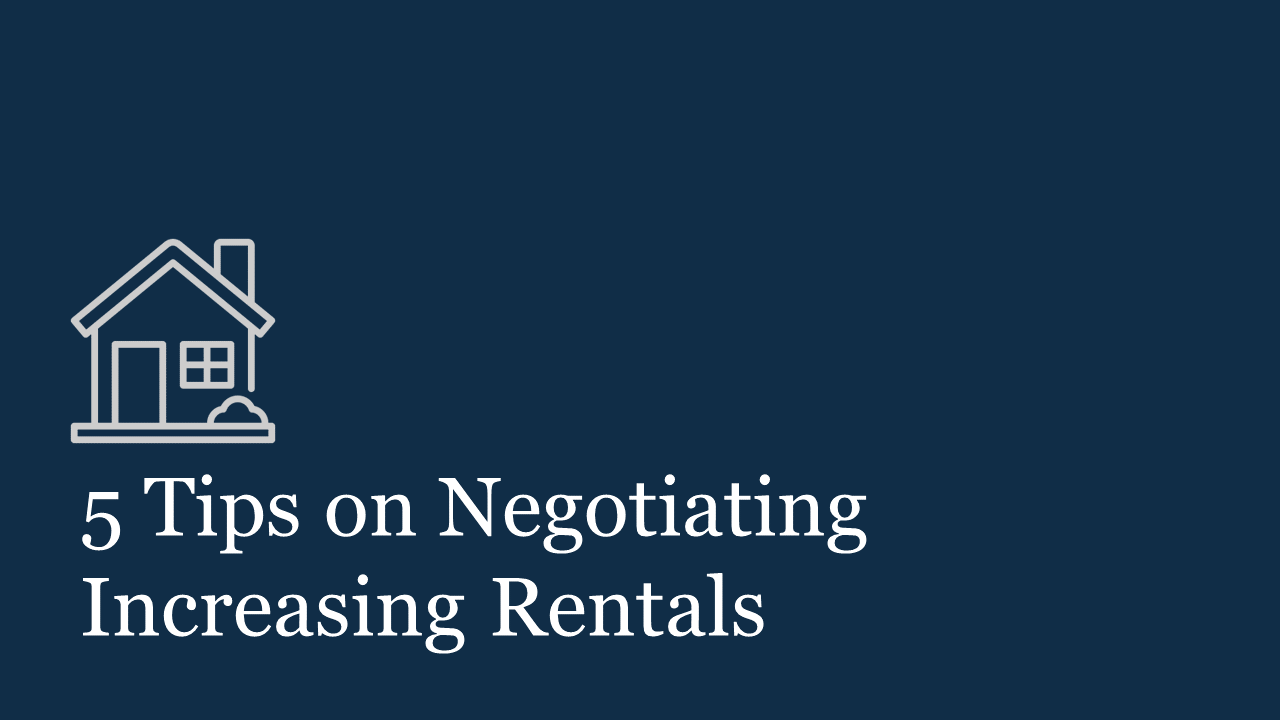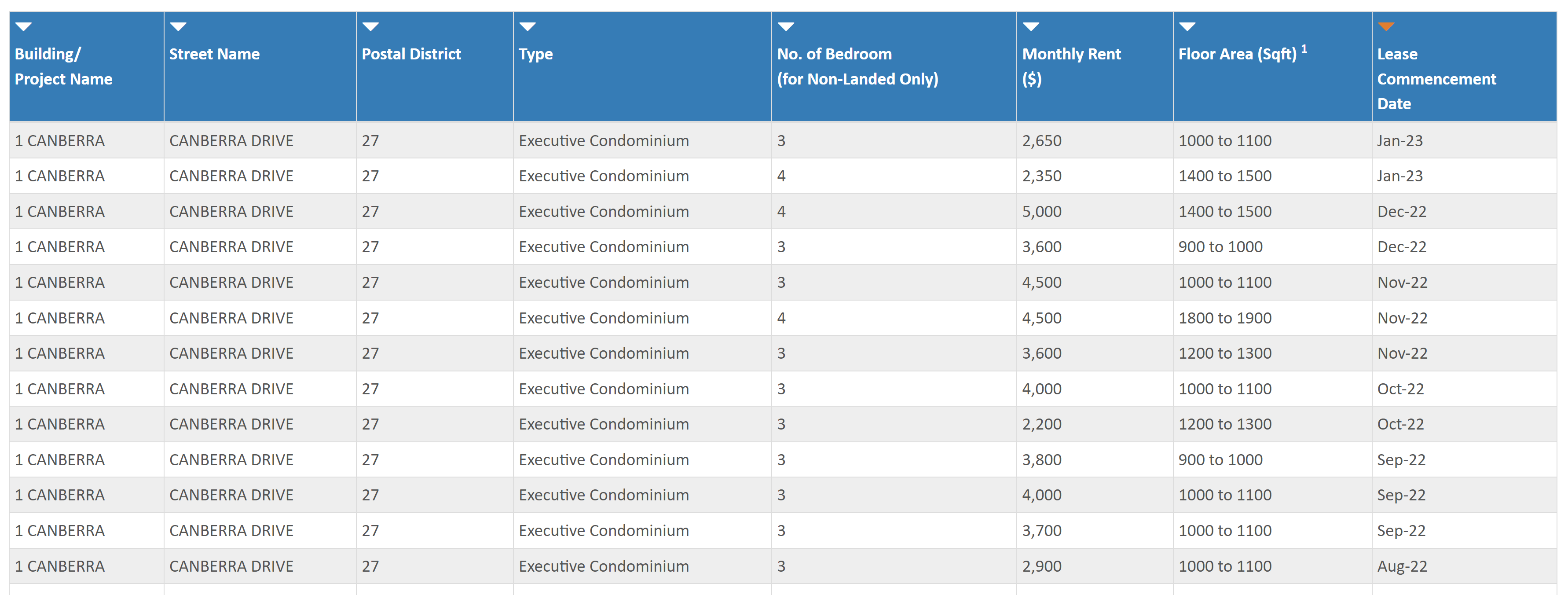5 Tips for Dealing and Negotiating Increasing Rentals
Mar 07, 2023
Singapore is known for a country where the income potential is higher, together with a more expensive costs of living. Unfortunately over the past 2 years, rentals rates have been increasing as much as 50% up to 100%! As a result, many renters in Singapore are increasingly finding it challenging to keep up with the increasing rental prices.
In this article, I share my top suggestions to cope with the increasing rentals in Singapore.
Tip #1: Research Ahead 90-120 Days Before Renewals
The first step in coping with increasing rentals in Singapore is to research current market rates. This data will provide you with the foundation to make good financial decisions when it comes to deciding to move, negotiate, downsize, or simply keep the rental.
Thankfully, researching is easy. The Urban Redevelopment Authority publishes all rental rates in Singapore per location. You can begin your research by going to this website:
>> https://www.ura.gov.sg/realEstateIIWeb/resiRental/search.action
In this example, I'm searching for all rental rates at 1 Canberra from Jan 2021 to Jan 2023 for a 2-year historical period.

In this next image, you'll see the results displayed by where it shows the historical actual rental rates for the property, alongside the size of the property.

The amazing thing is you can do this for any housing project in Singapore, whether it's HDBs, Condos, and even landed housing.
For the purposes of research it helps to know the rental rates of:
- Your current place of residence over the past 1-2 years.
- Nearby residential options that you are considering with the same size.
Armed with this data, you can now proceed to the next step which is to estimate what's possible.
Tip #2: Estimate the possibilities.
From your research you can now begin to 'guess' how much your landowner would likely be proposing for the increase based on the historical rental rates.
For instance, if you're currently staying in a 3-bedroom condo with floor area of 1200 to 1300 square feet... and you saw the rentals over the last year range from: $2,200 all the way to $3,600... then this also the possible range of what your landlord can charge upon renewing.
This is because the landlord will also likely be getting advise from the real estate advisor who also reviewed this data.
Once you have this range, the next step is to review your budget and try to answer the following questions:
- Up to what amount can I afford as rent?
Normally this should be no more than 30% of one's income. However, it really depends your total expenses, especially if you are providing for family back home.
This number is important because it's the answer to how much you'd be willing to negotiate the place for. This is the number when the landlord refuses, you'll likely look for another place. - Up to what amount can I actually 'accept' to pay for in this place?
One client of mine shared that their rental went up from $4,000 up to $6,000. Since they were already earning a lot, it was actually an amount they could afford to pay. However they refused it because they couldn't 'take' actually paying that much for rent.
In other words, they wouldn't be comfortable living in the place, because it was simply too much.
Once you have reviewed your budget and know your numbers, then it's time to engage and negotiate.
Tip #3: Initiate the Renewal Conversation
Most rental agreements are generally begun 90 days before renewal. This is a good time to bring up the conversation with your landlord or agent.
It could begin with a message like this:
"Hi! Since it is 90 days already before our lease expires, we would like to state my intent to renew.
We really like the place and have been taking care of it as if it our own. We're also aware that rent has been increasing across the board, so we will likely be renewing if it still fits in our budget.
Hoping to get the terms of renewal so we can also plan accordingly. Thank you!"
This message does many things in terms of negotiations. First is that it reminds the land owners who might be trying to 'maximize opportunities or rent', that their property is being occupied by good and reasonable people. In other words, it humanizes the conversation, rather that it simply being about money and numbers.
Second, your initiative makes you a more trustworthy tenant and reminds the landowner that their property is actually in good hands.
Third, is the casual mention of the budget. Ultimately the conversation in the landowners mind will shift from 'how much money can I get from this property" to "Should I secure another year or two's worth of rental income?"
After you send this, you'll likely receive their asking number. And likely, it's going to be higher than your current rent. (If not, then you're extremely lucky!)
Now it's time to negotiate:
Tip #4: Negotiate Clearly and with Integrity
Depending on the number they put out, it can be acceptable, too much or, way out of budget.
The important thing to remember during negotiations is to be clear in what you're asking for, and to also do it with integrity.
Integrity here means not playing the 'how low can you go' game where it's like in the movies where the parties go back and forth...
$5,500?
$4,000.
$5,000.
$4,200.
$4,500.
Okay agreed on $4,500.
Thinking of negotiations in this manner will only make the landlord and agent only think about the money side of things, which is the exact opposite of our goal.
Instead, you can try this approach:
Let's say the rental is being bumped up from $3,000 to $4,500, and your budget is only until $3,500...
Here is a sample response (if $4,500 is actually the high end of the market rates).
"Hi, thanks for the reasonable rental increase. We're aware that the potential for rent has really become that high.
Although to be upfront our budget at this time is only until $3,500. I know this is a huge difference from your asking, but hoping it could still be considered?
If so, we'd like to renew for 2 more years at that rate so that the landowner also gets to secure occupancy for longer."
Then you can follow-up with additional reasons why you'd make a good tenant. Example, one client of mine followed up their negotiations with:
"I like to believe we are not fussy tenants, happy with the place and doing our best to take care of it.
If it also helps to know, our passes were renewed for the next 3 years so it's likely we'll be staying in Singapore for a longer period too so the owner gets secured occupancy without headaches".
So negotiations are all about being upfront and clear to what you can bring to the table. To the landowner what matters to them are usually: passive income, no headaches, and the property is in good shape.
If you communicate this, then you are more likely to get them over to your side.
But of course, it's very possible that the landowner will be firm on their asking prices... in these cases we go to the next step.
Tip #5: Be Open to Exploring Alternative Housing Options
Here are some options to consider when rent is simply too high:
- Negotiate 1 last time, but renewing only for one year. Similar to the message above, you can state that if the rental was decreased to $3,600 you'd likely renew for 1 year because you'd like to avoid having to move and you really like the place. Additionally, the owner gets to avoid any additional expenses incurred whenever there's a new tenant.
- Consider budget revisions. This means looking at your expenses and checking if there's anyway you can save on other costs to cope with the rent. Maybe this could mean having 1 less travel destination during the year. Maybe it could involve cancelling some memberships or subscriptions (as they can balloon up quickly to hundreds every month).
- Consider downsizing or having a roommate. Getting a "smaller place" because of the budget can be hard to do emotionally. It can feel like you're taking a step backwards in life. It can also feel isolating, especially if you or your family has already formed relationships with your neighbors. In this, I simply hope to share that you're not alone, and remember this is only temporary.
Now regardless of which option feels right for you, whether you feel forced to save more, or live in a smaller space, or in a less convenient or accessible area...
It's okay. I want to remind you that this is temporary. There are times when things go our way, there are times when things don't.
We are not determined by where we live, and what we have. I believe that every person's identity is determined by what they do for themselves, and for their family.
You see, downsizing and saving is a sign of a responsible person who is looking out and planning for their future. And it is very likely that this same diligent, responsible and hardworking person will progress in their career and achieve their financial goals.
It's only a matter of time.
In conclusion, if you're someone feeling the burden of rental increases, I do hope this article helps you strategize your upcoming renewal.
And whatever is the outcome, know that you're not alone in this. And I believe that it's the actions you take (like market research, negotiating, and adapting) that matters. Because it's those same behaviors that will lead to a brighter financial future.


